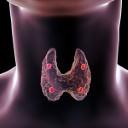-
Survival Statistics 101
Survival statistics are important—and sometimes confusing. Cancer Today spoke with statistics experts about what these numbers really mean.
by Ashley P. Taylor
-
“Congrats! You Have the ‘Good’ Cancer”
Many people know thyroid cancer as a cancer type with a relatively good prognosis, but the disease still has profound effects on patients and survivors, writes thyroid cancer survivor Carly Flumer.
by Carly Flumer
-
Learning the Language of Chemotherapy
Cancer patients often do not understand words their doctors use while talking about chemotherapy, but a new video series helps explain these terms.
by Jen Tota McGivney
-
Misunderstandings About Cancer DNA Tests
Many cancer patients who received genomic testing of their cancers in a clinical trial did not fully understand the purpose of the testing.
by Emma Yasinski
-
What Not to Say to a Cancer Patient
When visiting a friend or family member who is sick, it's good to leave platitudes at the door.
by Michael Gavaghen
-
Considering the Term “Cancer Survivor”
A study investigates how people who have been diagnosed with cancer feel about being called survivors.
by Jen Tota McGivney
-
What Do Clinical Trial Endpoints Really Measure?
A study investigates whether a commonly used clinical trial endpoint, progression-free survival, can be used to predict quality of life.
by Jon Kelvey
Cancer Talk
At-home Prostate Cancer Test May Help Some Men Avoid Biopsy
The test, which analyzes urine for 18 cancer-specific genes, ruled out the need for biopsy in men with elevated PSA without a digital rectal exam.
by Sandra Gordon
The Power of ComedyIn a new play, the pain of cancer can be a chance to laugh.
by Ashley P. Taylor
Melanoma Risk in Childhood Cancer SurvivorsPeople treated for childhood cancer found to have twice the risk of developing melanoma as an adult.
by Cameron Walker
Online Second OpinionsMore than half of patients who participated in a program offering online second opinions were recommended a change to their treatment plan.
by Eric Fitzsimmons











